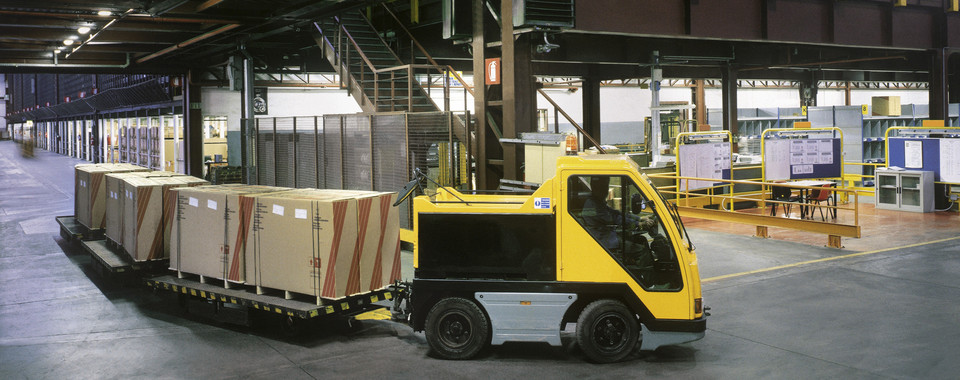
Apr 14, 2025 // Zdravka Ley
More than just in a circle: How tugger trains are changing internal logistics thanks to intelligent management
Why intelligent tugger train optimization is crucial.
Nov 5, 2024 Dr. Eva Savelsberg
ShareAccording to a recent market analysis, the cloud logistics market was valued at USD 21.2 billion (EUR 19.6 billion) in 2023 and is projected to grow at a compound annual growth rate (CAGR) of over 12% from 2024 to 2032.¹ Predictions show that within the next five years, a remarkable 86% of supply chain companies will integrate cloud computing into their operations, up from the current 40% adoption rate.² During this time frame, cloud technology will rise from being a technology disruptor and capability enabler to the role of a business necessity, according to Gartner.³
“Embracing cloud technology is no longer a luxury but a requirement. It allows logistics operators to streamline processes, reduce costs, and stay competitive in a rapidly evolving market.”, says Dr. Eva Savelsberg, SVP of INFORM’s Terminal & Distribution Center Logistics Division. But what makes cloud transformation this indispensable? INFORM lists six key advantages that logistics companies need to know now.
Cost Efficiency: Focus on Logistics, Not IT Overheads
Cloud services allow logistics companies to shift their focus from managing IT infrastructure to optimizing logistics operations. By eliminating the need for extensive on-premises hardware and reducing the associated maintenance costs and admin complexities, companies can allocate more resources to their core business activities. A strategic shift like this not only enhances operational efficiency but also drives long-term cost savings.
Scalability and Flexibility: Grow and Adapt with Ease
One of the most significant advantages of cloud services is their ability to scale resources up or down based on demand. Seasonal fluctuations? Sudden spikes in demand? Common experiences for logistics operations, but nothing to be worried about anymore. Cloud-native applications can seamlessly adapt to handle increased workloads, ensuring that operations run smoothly even during peak times.
Faster Innovation: Accelerate Your Time-to-Market
The growth of e-commerce, the global nature of “just-in-time” supply chains, and high consumer expectations all call for the ability to adapt quickly. That’s why rapidly innovating and deploying new features is crucial for maintaining a competitive edge in the logistics industry. By leveraging cloud technology, companies can continuously improve their offerings to stay ahead of the curve – or rather, ahead of their consumer’s needs.
Real-Time Visibility: Enhance Operational Transparency
It’s hard to remember a time when data access wasn’t crucial for effective logistics management. Cloud services act like a crystal-clear window into operations, allowing companies to monitor shipments, inventory, and delivery statuses in real-time. This gained transparency empowers managers to make smarter decisions on the fly, swiftly tackling issues, fine-tuning routes, and boosting overall efficiency.
Resilience and Availability: Run Operations Like a Well-Oiled Machine
Cloud services offer high resilience and availability by distributing resources across multiple regions. This redundancy ensures that logistics operations can continue uninterrupted, even in the event of a localized failure. While achieving such a level of resilience with on-premises systems would be prohibitively expensive, the cloud makes it accessible and cost-effective.
Enhanced Collaboration: Connect and Coordinate Seamlessly
Logistics companies are perfect examples of dynamic ecosystems. Suppliers, carriers, and internal teams each play a vital role in it; however, at the same time, they contribute to its complexity. Cloud adoption transforms logistics by breaking down barriers to collaboration. By centralizing data, all stakeholders can quickly access the uniform information as required, make informed decisions, and respond to changes swiftly by shifting operations from a reactive state towards a more proactive one.
The Business Case Stacks Up
The benefits of cost efficiency, scalability, flexibility, innovation, visibility, resilience, availability, and collaboration make a compelling case for cloud adoption. By leveraging these advantages, logistics operators can enhance their operational efficiency, reduce costs, and stay competitive in a rapidly evolving market. “Think of data as the seeds, and the cloud as the fertile soil. By planting data in the cloud, logistics companies cultivate a rich harvest of insights and innovations that drive their business forward.”, says Alex Van Winckel, Director Strategic Relations and Sales at INFORM’s Terminal & Distribution Center Logistics Division.
Navigating this transformation, we at INFORM offer valuable expertise and solutions for our partners. With a deep understanding of the logistics sector, a commitment to innovation, and AI-powered optimization, INFORM can help your business position itself for the future.
Learn more about our Yard Management System for Distribution Centers, and our solutions for Maritime and Intermodal Terminals.
Sources:
¹ Cloud Logistics Market Size & Share, Growth Report 2024-2032
² Generative AI and cloud are the major trends revolutionizing logistics in 2024, reveals report
³ Gartner Says Cloud Will Become a Business Necessity by 2028 | Wire19

Dr. Eva Savelsberg is Senior Vice President of INFORM’s Terminal & Distribution Center Logistics Division and is a member of INFORM’s Executive Board. She specializes in AI & Optimization software that renders a wide range of operational processes more productive, agile, and reliable. Eva received her PhD in Mechanical Engineering in 2002 from the University of Aachen (RWTH). She has published 5 books and over 50 papers on innovation in freight transportation and is a regular contributor to industry publications and events.

Alex Van Winckel is Director Strategic Relations and Sales at INFORM’s Terminal & Distribution Center Logistics Division. He has been in the container terminal industry for over 15 years when he kicked off his career working to deploy a Terminal Operating System (TOS) to HHLA‘s CTB terminal in Hamburg. Over the course of the past decade, Alex has participated in numerous optimization projects in logistics, predominantly in the maritime and intermodal container terminal industries. In his director role at INFORM, Alex is responsible for maintaining existing business relationships and establishing new sustainable customer collaborations.